By Leen Randell
Updated: Jul 04, 2024
10 Best Herbal Decoctions For Mouth Ulcers
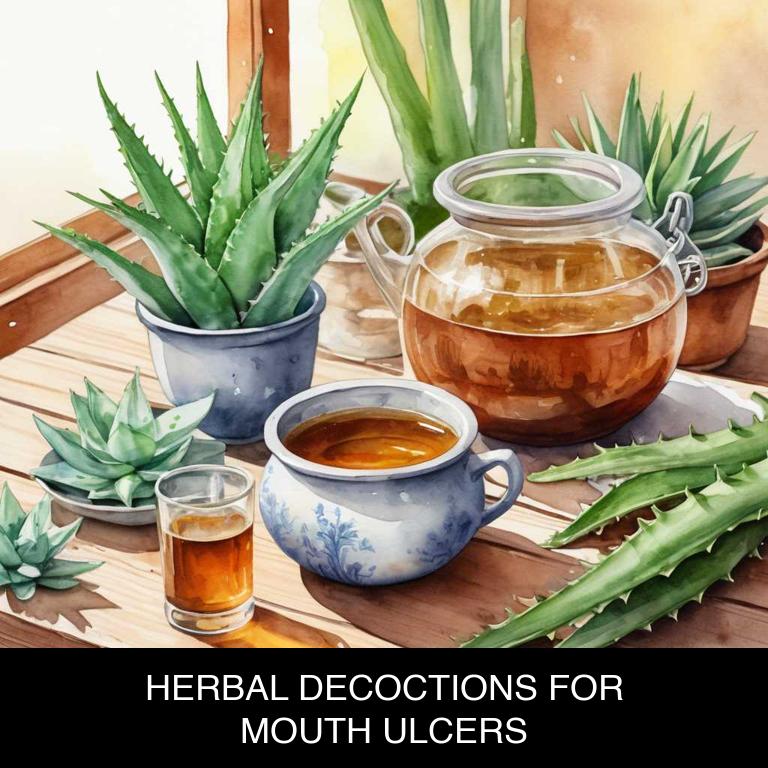
Herbal decoctions for mouth ulcers are a natural and effective way to alleviate the discomfort and pain associated with these sores.
By steeping herbs such as chamomile, calendula, or sage in hot water, a soothing liquid is created that can be swished around the mouth to reduce inflammation and promote healing. This helps to reduce the size and pain of mouth ulcers, allowing individuals to eat, speak, and carry out daily activities with greater ease.
For example, a person suffering from frequent mouth ulcers may find relief by using a chamomile decoction, which can help to calm the gums and promote a faster healing process, ultimately improving their overall quality of life.
The following article describes in detail the most important decoctions for mouth ulcers, including medicinal properties, parts of herbs to use, and recipes for preparations.
- 1. Aloe vera
- 2. Calendula officinalis
- 3. Hypericum perforatum
- 4. Mentha x piperita
- 5. Camellia sinensis
- 6. Taraxacum officinale
- 7. Glycyrrhiza glabra
- 8. Sambucus nigra
- 9. Althaea officinalis
- 10. Echinacea purpurea
- What is the best combination of herbal decoctions to use for mouth ulcers?
- What ailments similar to mouth ulcers are treated with herbal decoctions?
1. Aloe vera
Aloe decoctions helps with mouth ulcers because of its potent anti-inflammatory and soothing properties.
The aloe vera gel contains a variety of bioactive compounds, including aloin and aloe-emodin, which have been shown to reduce pain, inflammation, and bacterial growth in the mouth. When applied topically as a decoction, these compounds help to speed up the healing process by promoting tissue repair and reducing discomfort associated with mouth ulcers.
This natural remedy provides a gentle and effective way to alleviate symptoms and promote oral health.
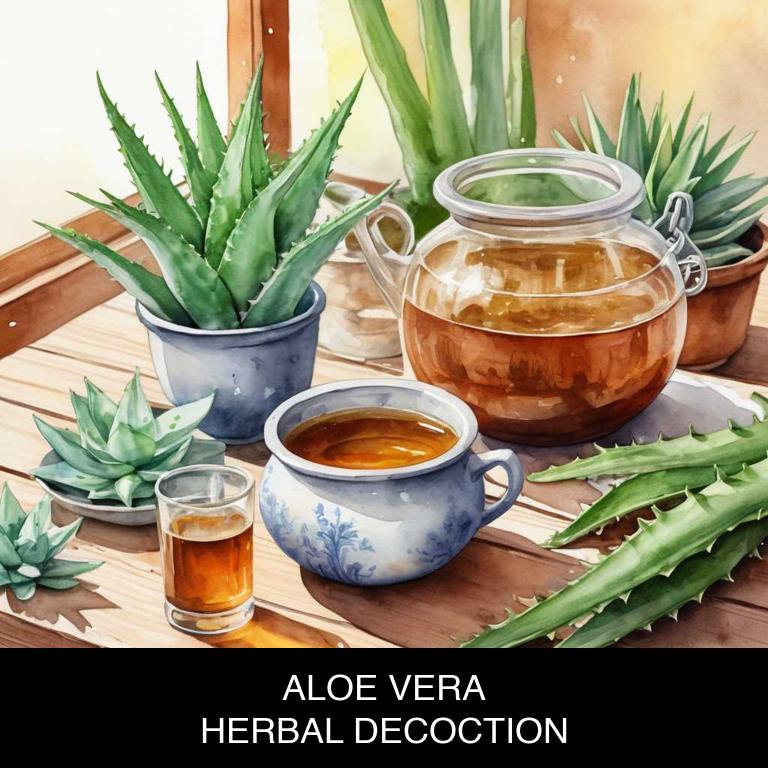
Medicinal Constituents
The list below shows the primary medicinal constituents in Aloe vera decoctions that help with mouth ulcers.
- Aloe-emodin: Aloe-emodin, a type of anthraquinone, has anti-inflammatory properties that help reduce pain and inflammation associated with mouth ulcers.
- Saponins: Saponins in Aloe vera have antimicrobial properties that prevent bacterial infections and promote wound healing, which can aid in the recovery of mouth ulcers.
- Glucomannan: Glucomannan, a polysaccharide, exhibits soothing and protective effects on the mucous membranes, helping to reduce discomfort and promote healing of mouth ulcers.
Parts Used
The list below shows the primary parts of aloe used to make decoctions for mouth ulcers.
- Leaves: They are used due to their high gel content, which has anti-inflammatory and soothing properties, helping to heal and reduce pain from mouth ulcers.
- Roots: They are used due to their ability to provide sustained release of bioactive compounds, including glycoproteins and anthraquinones, which can help to reduce pain and inflammation in mouth ulcers.
Quick Recipe
The following recipe gives a procedure to make a basic aloe for mouth ulcers.
- Choose fresh aloe vera leaves from a reputable source and select 2 to 3 leaves per 1 cup of water.
- Cut the aloe vera leaves into small pieces and remove the outer skin to expose the gel inside.
- Combine the aloe vera gel with 1 cup of water in a saucepan and heat it on low for 10 minutes.
- Reduce the heat to a simmer and let the mixture steep for 20 to 30 minutes to release the active compounds.
- Strain the mixture through a cheesecloth or fine mesh to remove any solids and discard the solids.
2. Calendula officinalis
Pot marigold decoctions helps with mouth ulcers because of its anti-inflammatory and antibacterial properties.
The decoction's flavonoids and polyphenols work to reduce swelling, redness, and pain associated with mouth ulcers. Additionally, the decoction's antiseptic properties help combat bacteria and fungi that can contribute to the development and prolongation of mouth ulcers.
By soothing and calming the affected area, pot marigold decoctions promote a healthy healing environment, allowing mouth ulcers to resolve more quickly and effectively.
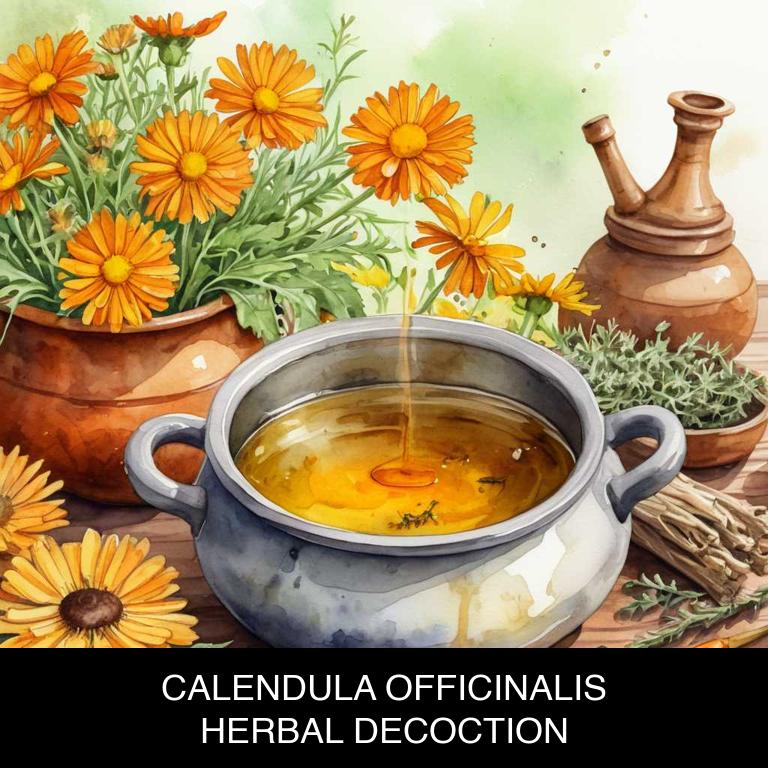
Medicinal Constituents
The list below shows the primary medicinal constituents in Calendula officinalis decoctions that help with mouth ulcers.
- Flavonoids: They have anti-inflammatory properties, which help reduce pain, swelling, and inflammation associated with mouth ulcers.
- Phenolic acids: These compounds have antimicrobial and anti-inflammatory effects, helping to prevent infection and reduce the healing time of mouth ulcers.
- Triterpenoids: They have anti-inflammatory and antimicrobial properties, which help reduce pain and prevent infection in mouth ulcers, promoting a faster healing process.
Parts Used
The list below shows the primary parts of pot marigold used to make decoctions for mouth ulcers.
- Flowers: The flowers are commonly used due to their anti-inflammatory and antimicrobial properties, which help soothe and heal mouth ulcers.
- Leaves: The leaves are utilized for their astringent and antiseptic properties, which aid in reducing swelling and preventing infection in mouth ulcers.
- Stems: The stems are also used, although less frequently than flowers and leaves, due to their similar properties that promote wound healing and reduce inflammation in mouth ulcers.
Quick Recipe
The following recipe gives a procedure to make a basic pot marigold for mouth ulcers.
- Gently dry 10-20 calendula flowers in a single layer at room temperature for 2-3 weeks.
- Grind 2-3 teaspoons of dried calendula flowers into a fine powder using a mortar and pestle.
- Combine 1 teaspoon of powdered calendula with 1 cup of boiling water in a heat-resistant cup.
- Steep the mixture for 5-7 minutes then strain the liquid through a cheesecloth into a bowl.
- Store the resulting decoction in an airtight container in the refrigerator for up to 3 days.
3. Hypericum perforatum
St John's wort decoctions helps with mouth ulcers because of its anti-inflammatory and antimicrobial properties.
The decoction's flavonoids and hyperforin work to reduce swelling and ease pain, promoting healing and soothing the affected area. Additionally, St John's wort's antimicrobial compounds help combat bacteria and fungi that may be contributing to the ulceration.
As a natural remedy, it can provide relief from mouth ulcers without the need for harsh chemicals or medications, making it an effective and gentle solution for mouth sores.
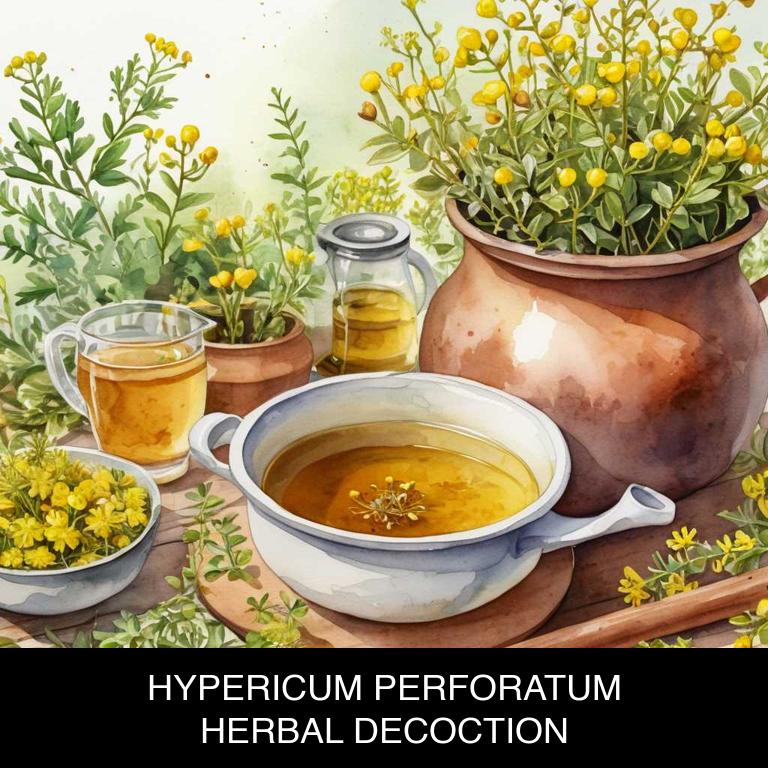
Medicinal Constituents
The list below shows the primary medicinal constituents in Hypericum perforatum decoctions that help with mouth ulcers.
- Quercetin: A flavonoid phenolic compound that exhibits anti-inflammatory properties, which can help reduce swelling and pain associated with mouth ulcers.
- Naphthodianthrone hyperforin: A naphthodianthrone compound that has antimicrobial properties, which can help prevent infections that can exacerbate mouth ulcers.
- Quercetin-3-glucoside: A flavonoid glycoside that has antioxidant properties, which can help protect the oral mucosa from oxidative stress and promote faster healing of mouth ulcers.
Parts Used
The list below shows the primary parts of st john's wort used to make decoctions for mouth ulcers.
- Leaves: The leaves are used due to their high concentration of hypericin, which has antimicrobial and anti-inflammatory properties that help in soothing mouth ulcers.
- Flowers: The flowers are used due to their ability to reduce inflammation and promote healing in the affected area, which helps in treating mouth ulcers.
- Roots: The roots are used due to their high content of flavonoids, which have antimicrobial and anti-inflammatory properties that help in treating mouth ulcers and promoting healing.
Quick Recipe
The following recipe gives a procedure to make a basic st john's wort for mouth ulcers.
- Gather 1 to 2 teaspoons of dried hypericum perforatum flowers to create the herbal decoction.
- Combine the dried flowers with 8 ounces of boiling water in a glass container.
- Steep the mixture for 5 to 10 minutes to allow the active compounds to infuse.
- Strain the decoction through a fine-mesh sieve into a separate container to remove the solids.
- Allow the decoction to cool before consuming it in 2 to 3 doses per day.
4. Mentha x piperita
Peppermint decoctions helps with mouth ulcers because of its anti-inflammatory properties, which reduce swelling and ease discomfort.
The menthol in peppermint also acts as a local anesthetic, numbing the affected area and providing quick relief from pain. Additionally, peppermint's antiseptic properties help to prevent infection and promote healing by reducing bacteria growth on the ulcer site.
As a result, peppermint decoctions offer a natural and effective way to alleviate mouth ulcers' discomfort, allowing for a faster recovery process.
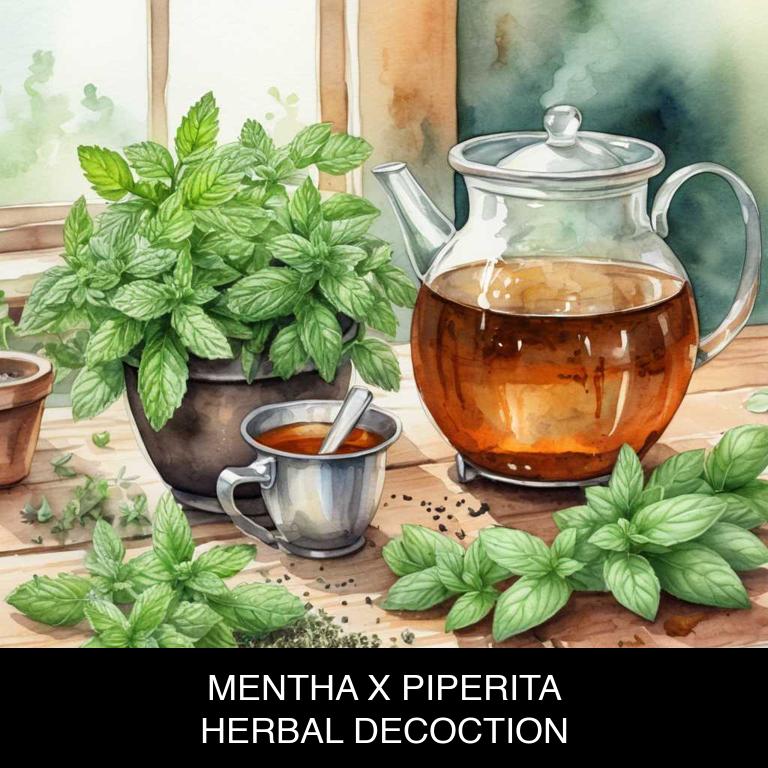
Medicinal Constituents
The list below shows the primary medicinal constituents in Mentha x piperita decoctions that help with mouth ulcers.
- Rosmarinic acid: This phenolic compound has anti-inflammatory and antioxidant properties, which can help reduce pain and inflammation associated with mouth ulcers.
- Menthol: As a terpene, menthol has analgesic and antibacterial properties, which can help numb the pain and prevent infection in mouth ulcers.
- Cineole: This terpene has anti-inflammatory and antimicrobial properties, which can help reduce inflammation and prevent bacterial growth in mouth ulcers, promoting faster healing.
Parts Used
The list below shows the primary parts of peppermint used to make decoctions for mouth ulcers.
- Leaves: Leaves are the primary part used due to their high content of menthol, which provides analgesic and anti-inflammatory properties that help soothe mouth ulcers.
- Stems: Stems of Mentha x piperita contain menthol, which aids in numbing the affected area and reducing pain associated with mouth ulcers.
- Roots: The roots of the plant contain a compound called limonene, which has been found to exhibit antimicrobial properties that help prevent infection and promote healing of mouth ulcers.
Quick Recipe
The following recipe gives a procedure to make a basic peppermint for mouth ulcers.
- Harvest 20-30 fresh leaves of mentha x piperita by cutting them from the stem using scissors or pinch them off.
- Chop the harvested leaves into small pieces using a sharp knife or a pair of kitchen shears.
- Combine the chopped leaves with 500ml of boiling water in a heat-resistant glass or ceramic container.
- Steep the mixture for 10-15 minutes and then strain it using a cheesecloth or a fine-mesh sieve.
- Discard the solids and store the resulting decoction in a clean glass bottle in the refrigerator for up to 3 days.
5. Camellia sinensis
Tea decoctions helps with mouth ulcers because of their soothing, anti-inflammatory properties.
Many herbs used in these decoctions, such as chamomile, calendula, and peppermint, have natural astringent and antimicrobial properties that help to reduce swelling and prevent infection. These herbal teas can be applied topically to the affected area by swishing them around the mouth or holding them in the mouth for a few minutes before spitting them out.
This helps to create an environment that is conducive to healing, reducing pain and discomfort associated with mouth ulcers.
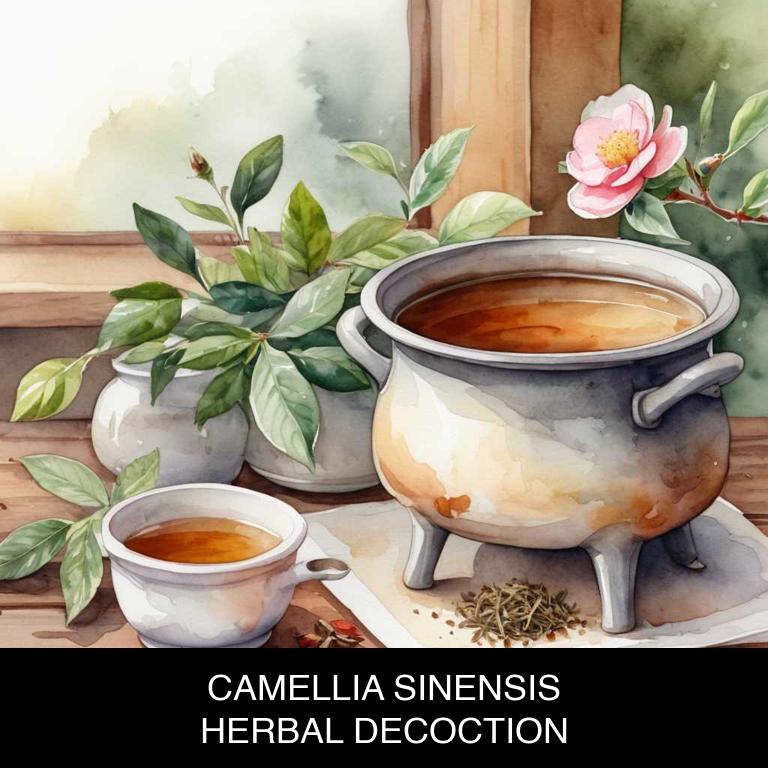
Medicinal Constituents
The list below shows the primary medicinal constituents in Camellia sinensis decoctions that help with mouth ulcers.
- Catechins: These flavonoid compounds have anti-inflammatory and antioxidant properties, which help reduce the severity and duration of mouth ulcers by reducing inflammation and promoting wound healing.
- Theaflavins: These polyphenolic compounds have antibacterial and anti-inflammatory properties, which help prevent infection and reduce inflammation in mouth ulcers, promoting faster recovery.
- Gallic acid: This phenolic acid has anti-inflammatory and antioxidant properties, which help reduce inflammation and promote wound healing in mouth ulcers, also exhibiting antimicrobial activity to prevent infection.
Parts Used
The list below shows the primary parts of tea used to make decoctions for mouth ulcers.
- Leaves: Used for their anti-inflammatory and antimicrobial properties to help soothe and reduce the pain of mouth ulcers.
- Buds: Used for their astringent and anti-inflammatory properties to help reduce swelling and promote healing of mouth ulcers.
- Flowers: Used for their anti-inflammatory and antimicrobial properties to help reduce the pain and discomfort caused by mouth ulcers.
Quick Recipe
The following recipe gives a procedure to make a basic tea for mouth ulcers.
- Measure out 1 teaspoon of loose camellia sinensis leaves for every 8 ounces of water needed.
- Heat 8 ounces of fresh water in a teapot or saucepan to a temperature of 212 degrees fahrenheit.
- Steep the camellia sinensis leaves in the hot water for 3 to 5 minutes to allow flavors to develop.
- Strain the tea using a tea strainer or cheesecloth into a cup to remove loose leaves.
- Serve the hot tea immediately and enjoy as is or add sweeteners or flavorings as desired.
6. Taraxacum officinale
Dandelion decoctions helps with mouth ulcers because of its anti-inflammatory properties.
The plant's extracts contain compounds like taraxasterol, which have been shown to reduce inflammation and swelling in the mucous membranes, providing relief from mouth sores. Additionally, dandelion has antibacterial properties that can help combat infections that may contribute to ulcer formation.
As a natural and gentle remedy, dandelion decoctions offer a soothing and effective way to alleviate mouth ulcers and promote healing.

Medicinal Constituents
The list below shows the primary medicinal constituents in Taraxacum officinale decoctions that help with mouth ulcers.
- Flavonoids: These compounds have anti-inflammatory properties, which can help reduce swelling and pain associated with mouth ulcers.
- Saponins: Saponins have antimicrobial and anti-inflammatory effects, which can help prevent infection and promote wound healing in the mouth.
- Polysaccharides: Polysaccharides, particularly inulin, have antioxidant and anti-inflammatory properties, which can help reduce oxidative stress and promote tissue repair in the mouth.
Parts Used
The list below shows the primary parts of dandelion used to make decoctions for mouth ulcers.
- Leaves: The leaves are used due to their anti-inflammatory and antimicrobial properties, which help to soothe and heal mouth ulcers.
- Roots: The roots are used because they contain a high concentration of inulin, a prebiotic that has been shown to reduce inflammation and promote healing in the mouth.
- Flowers: The flowers are used due to their ability to reduce inflammation and promote wound healing, making them a popular ingredient in herbal remedies for mouth ulcers.
Quick Recipe
The following recipe gives a procedure to make a basic dandelion for mouth ulcers.
- Harvest 25-30 fresh taraxacum officinale leaves and roots in the early morning or late evening.
- Clean the harvested plant material with water to remove any dirt or debris.
- Combine the cleaned taraxacum officinale leaves and roots with 500ml of water in a saucepan.
- Bring the mixture to a boil and then reduce the heat to a simmer for 10-15 minutes.
- Strain the decoction through a cheesecloth or a fine-mesh sieve into a clean container.
7. Glycyrrhiza glabra
Licorice decoctions helps with mouth ulcers because of its anti-inflammatory properties, which reduce swelling and pain in the affected area.
The decoction also contains glycyrrhizin, a compound that inhibits the production of enzymes that break down tissues, thereby promoting faster healing. Additionally, licorice root has antimicrobial properties, helping to eliminate bacteria that may contribute to ulcer formation.
By soothing and calming the mouth lining, licorice decoctions provide relief from discomfort and promote healthy oral tissue regeneration.

Medicinal Constituents
The list below shows the primary medicinal constituents in Glycyrrhiza glabra decoctions that help with mouth ulcers.
- Glycyrrhizin: This triterpenoid saponin helps with mouth ulcers by reducing inflammation and promoting healing through its anti-inflammatory and antioxidant properties.
- Liquiritigenin: This flavanone acts as a potent anti-inflammatory agent, helping to alleviate pain and promote healing of mouth ulcers by inhibiting the production of pro-inflammatory enzymes.
- Licoricidin: This triterpenoid saponin exhibits antimicrobial properties, which can help prevent secondary infections in mouth ulcers by inhibiting the growth of bacteria and other pathogens.
Parts Used
The list below shows the primary parts of licorice used to make decoctions for mouth ulcers.
- Roots: The roots are the most widely used part of Glycyrrhiza glabra due to their high concentration of glycyrrhizin, a compound known for its anti-inflammatory and soothing properties.
- Leaves: The leaves are also used in decoctions to treat mouth ulcers, as they contain flavonoids and saponins that have anti-inflammatory and antimicrobial properties.
- Stems: The stems of Glycyrrhiza glabra are sometimes used in decoctions for their mild anti-inflammatory properties, although they are less commonly used than the roots and leaves.
Quick Recipe
The following recipe gives a procedure to make a basic licorice for mouth ulcers.
- Weigh out 30 to 60 grams of dried roots of glycyrrhiza glabra.
- Crush the dried roots into smaller pieces using a mortar and pestle.
- Combine the crushed roots with 1 liter of cold water in a saucepan.
- Bring the water to a boil then reduce heat to a simmer for 10 to 30 minutes.
- Strain the decoction through a cheesecloth or a fine-mesh sieve into a clean container.
8. Sambucus nigra
Elder decoctions helps with mouth ulcers because of its anti-inflammatory properties, which soothe and calm the affected area.
The decoction's antiseptic qualities also help to prevent bacterial infections from developing, promoting a healthy recovery process.
Additionally, elder has been traditionally used to reduce swelling and ease pain, making it an effective natural remedy for mouth ulcers.
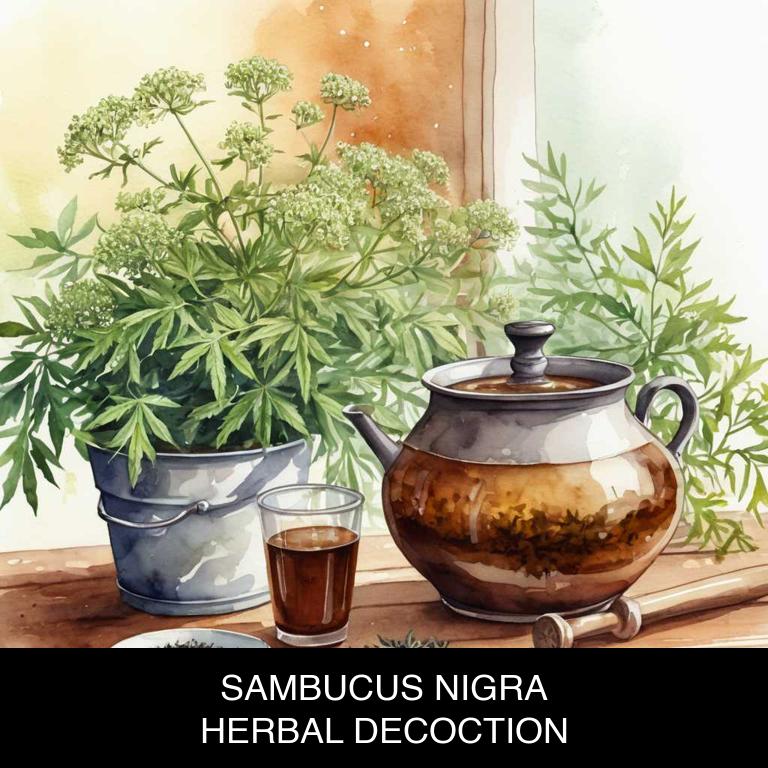
Medicinal Constituents
The list below shows the primary medicinal constituents in Sambucus nigra decoctions that help with mouth ulcers.
- Phenolic acids: Phenolic acids, particularly salicylic acid and gentisic acid, exhibit anti-inflammatory and antibacterial properties, which help to reduce pain, inflammation, and bacterial growth associated with mouth ulcers.
- Flavonoids: Flavonoids, such as quercetin, kaempferol, and isorhapontigenin, have potent antioxidant and anti-inflammatory effects, which help to soothe and protect the mucous membranes, reduce inflammation, and promote wound healing in mouth ulcers.
- Tannins: Tannins, including ellagic acid and gallic acid, possess antimicrobial and astringent properties, which help to reduce bacterial and fungal infections, minimize inflammation, and promote the healing process of mouth ulcers.
Parts Used
The list below shows the primary parts of elder used to make decoctions for mouth ulcers.
- Flowers: The flowers of Sambucus nigra are used to make decoctions for mouth ulcers because they contain anti-inflammatory and antimicrobial properties that help soothe and heal the ulcers.
- Leaves: The leaves of Sambucus nigra are used to make decoctions for mouth ulcers because they possess astringent properties that help reduce inflammation and promote healing.
- Buds: The buds of Sambucus nigra are used to make decoctions for mouth ulcers because they contain tannins that help reduce swelling and alleviate pain.
Quick Recipe
The following recipe gives a procedure to make a basic elder for mouth ulcers.
- Gather 1-2 cups of fresh sambucus nigra berries or 1/4 cup of dried sambucus nigra berries for decoction.
- Rinse the berries with water to remove dirt and debris from the sambucus nigra berries.
- Combine the sambucus nigra berries with 4 cups of water in a saucepan and bring to a boil.
- Reduce the heat and simmer the mixture for 30-40 minutes to release the sambucus nigra properties.
- Strain the decoction through a cheesecloth or a fine-mesh sieve into a clean container.
9. Althaea officinalis
Marshmallow decoctions helps with mouth ulcers because its mucilaginous properties soothe and protect the affected areas, reducing inflammation and discomfort.
The herbs' anti-inflammatory compounds help to reduce swelling and alleviate pain, while its emollient nature coats the ulcerated tissue, providing a barrier against further irritation.
Additionally, marshmallow's antioxidant properties help to neutralize free radicals that can contribute to ulcer formation, promoting healing and reducing the risk of recurrence.
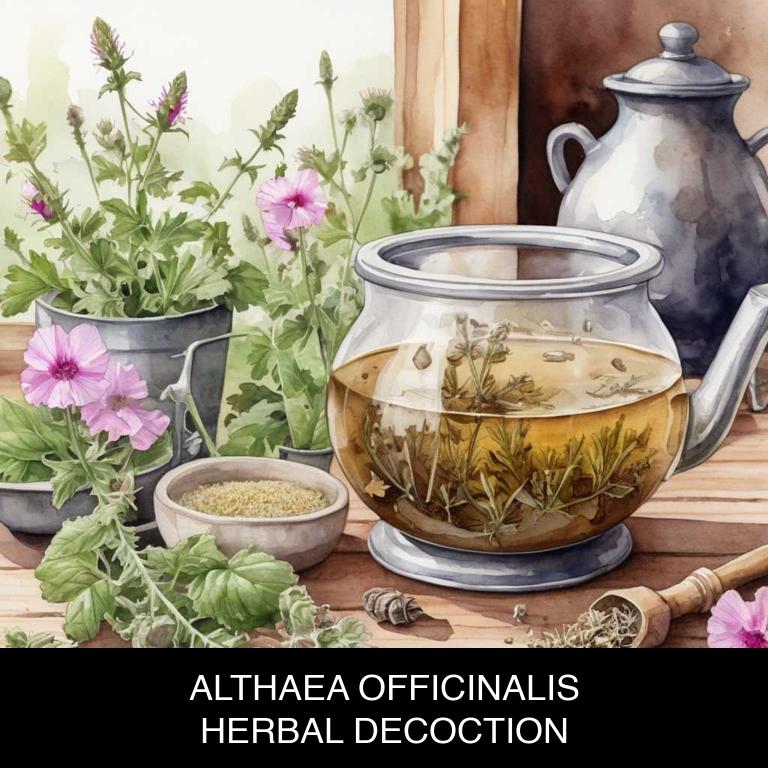
Medicinal Constituents
The list below shows the primary medicinal constituents in Althaea officinalis decoctions that help with mouth ulcers.
- Mucilages: Mucilages help to soothe and protect the mucous membranes in the mouth, reducing inflammation and discomfort associated with mouth ulcers.
- Gallic acid: Gallic acid has anti-inflammatory and antimicrobial properties, which help to reduce the severity of mouth ulcers by preventing bacterial growth and minimizing inflammation.
- Althea flavonoids: Althea flavonoids, particularly quercetin, possess anti-inflammatory and antioxidant properties, which help to reduce pain and swelling associated with mouth ulcers and promote healing.
Parts Used
The list below shows the primary parts of marshmallow used to make decoctions for mouth ulcers.
- Roots: They contain mucilages that help soothe and protect the mucous membranes in the mouth.
- Leaves: They also contain mucilages that can help reduce inflammation and promote healing of mouth ulcers.
- Barks: The barks contain similar mucilages that aid in soothing and protecting the affected areas.
Quick Recipe
The following recipe gives a procedure to make a basic marshmallow for mouth ulcers.
- Harvest 10 to 20 grams of dried root of althaea officinalis for decoction.
- Combine the harvested root with 500 milliliters of boiling water in a saucepan.
- Reduce the heat to a simmer for 10 to 15 minutes.
- Strain the decoction through a cheesecloth or a fine-mesh sieve into a cup.
- Allow the decoction to cool before consuming the liquid.
10. Echinacea purpurea
Purple coneflower decoctions helps with mouth ulcers because of its potent anti-inflammatory properties.
The decoction's active compounds, including echinacoside and alkamides, work to reduce swelling and pain in the affected area. Additionally, the antimicrobial agents present in the decoction help to combat bacteria and viruses that may be contributing to the development of ulcers.
By reducing inflammation and fighting off infections, purple coneflower decoctions provide effective relief from mouth ulcers, promoting a healthy and comfortable oral environment.
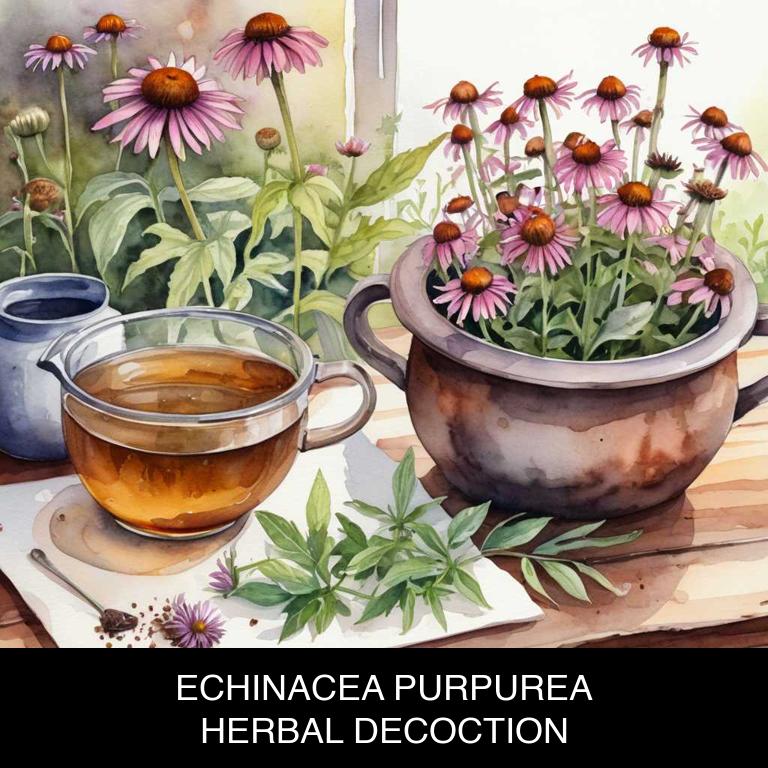
Medicinal Constituents
The list below shows the primary medicinal constituents in Echinacea purpurea decoctions that help with mouth ulcers.
- Cichoric acid: This caffeic acid derivative exhibits anti-inflammatory properties, which can help reduce swelling and pain associated with mouth ulcers.
- Alkylamides: These compounds have been shown to possess immunomodulatory effects, which can aid in the body's natural defense against viral infections that may contribute to the development of mouth ulcers.
- Cichorin: This sesquiterpene lactone has been found to have anti-inflammatory and antioxidant properties, which can help soothe and protect the oral mucosa, promoting faster healing of mouth ulcers.
Parts Used
The list below shows the primary parts of purple coneflower used to make decoctions for mouth ulcers.
- Roots: The roots are used for their anti-inflammatory and antimicrobial properties to soothe and heal mouth ulcers.
- Leaves: The leaves are used for their antiseptic and antioxidant properties to reduce inflammation and promote wound healing in the mouth.
- Buds: The buds are used for their anti-inflammatory and antimicrobial properties to calm and protect the mouth area affected by ulcers.
Quick Recipe
The following recipe gives a procedure to make a basic purple coneflower for mouth ulcers.
- Harvest echinacea purpurea roots and flowers in late summer or early fall when they are in full bloom.
- Clean and dry the echinacea purpurea roots and flowers to prevent contamination.
- Combine 1-2 teaspoons of dried echinacea purpurea roots and 1 teaspoon of dried flowers with 2 cups of water.
- Boil the mixture for 5-10 minutes then reduce heat and let it simmer for 10-15 minutes.
- Strain the decoction and let it cool before storing it in the refrigerator for up to 3 days.
What is the best combination of herbal decoctions to use for mouth ulcers?
The best combination of herbal decoctions that help with mouth ulcers is a blend of Aloe Vera, Turmeric, and Licorice Root.
Aloe Vera soothes and calms the mucous membranes, while Turmeric's anti-inflammatory properties reduce swelling and pain. Licorice Root, rich in glycyrrhizin, aids in healing and protecting the mucous membranes. Combine equal parts of each decoction and drink 2-3 times a day to alleviate symptoms.
This natural remedy promotes faster healing, reduces discomfort, and encourages overall oral health.
What ailments similar to mouth ulcers are treated with herbal decoctions?
Ailments similar to mouth ulcers that are treated with herbal decoctions are various oral lesions and inflammation.
For instance, gargling with a decoction of neem leaves is effective in treating aphthous stomatitis and thrush. A combination of turmeric and cinnamon decoction can help alleviate symptoms of gingivitis and periodontal disease.
Additionally, a decoction of aloe vera has been traditionally used to soothe and heal ulcers caused by canker sores.